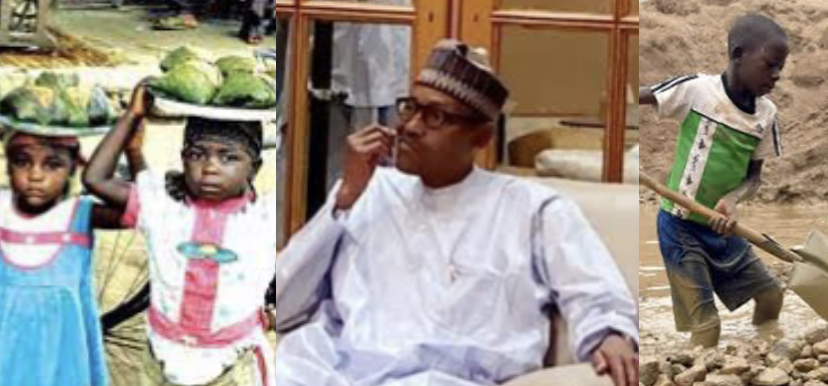Fifteen million Nigerian children are labourers under Buhari regime: Ngige

President Muhammadu Buhari’s regime and the International Labour Organisation have called for more collaboration and partnerships to tackle 15 million children from child labour in Nigeria.
“In Nigeria, child labour has become a scourge. Several children find themselves on the streets, forced to make a living, with others employed in industrial complexes and hazardous environments,” said labour minister Chris Ngige. “Statistics revealed there are about 15 million child workers as of 2020, according to the ILO, with the UN warning that the absence of mitigating strategies could see an increase of children engaged in child labour by the end of 2022.”
Mr Ngige said this at the National Children Conference commemorating the 2022 World Day Against Child Labour (WDACL), with the theme ‘Universal Social Protection to end Child Labour’ on Tuesday.
“Sub-Saharan Africa has seen 19.6 per cent of all African children in child labour and a possible nine per cent in hazardous work. This is in contrast to continued progress being made elsewhere in the world,” added the labour minister.
He mentioned that the labour ministry spearheaded the implementation and enforcement of the National Action Plan on Child Labour, Prohibition and Elimination of Forced Labour, Modern Slavery, and Human Trafficking in workplaces.
“The outbreak of COVID-19 brought with it a chain reaction that caused devastating effects on the long-term development and safety of children worldwide. As a result, families were plunged into poverty and vulnerable conditions, among others,” the minister further explained. “Also, the households needing to employ various means for survival; this meant children were forced to go into the streets to bring income, exposing them to higher levels of vulnerability compared to adults.”
Mr Ngige stressed that Mr Buhari’s regime had done a lot in addressing some challenges fuelling child labour in Nigeria, including “tackling poverty through Social Investment programmes such as Conditional Cash-transfer, Tradermoni, N-power, Home Grown School Feeding.”
(NAN)
We have recently deactivated our website's comment provider in favour of other channels of distribution and commentary. We encourage you to join the conversation on our stories via our Facebook, Twitter and other social media pages.
More from Peoples Gazette

Politics
Katsina youths pledge to deliver over 2 million votes to Atiku
“Katsina State is Atiku’s political base because it is his second home.”

Port Harcourt
Burnt Rivers Assembly: Court sets aside arrest warrant against Fubara’s chief of staff
On January 31, the judge issued a warrant for the arrest of Mr Ehie over his alleged involvement in the burning of part of the Rivers’ House of Assembly.

Politics
Keyamo overreacting, should apologise, lift Dana’s flight suspension: ART
Aviation minister Festus Keyamo has been reprimanded for trying to usurp the authority of the NCAA.

NationWide
Merging Civil Defence with police will worsen Nigeria’s insecurity, FG warned
“It is obvious that persons seeking the merger are ignorant of the roles of NSCDC as a special purpose security vehicle,” a security expert said.

Africa
South Africa’s systemic corruption closely related to ex-President Jacob Zuma’s administration: Report
The report alleged that “high-level political interference has undermined the country’s National Prosecuting Authority from responding to corruption.

Africa
Police corruption big problem in Kenya; security force compromised under President Ruto: U.S. Govt
Not only did the government try to cover up police-related killings, but Kenyan authorities asked medical personnel to keep silent on deaths recorded from police brutality.

NationWide
No one should die of malaria in Africa: WHO
“No one should die from malaria in Africa; indeed, every single malaria death is a death too many because malaria is preventable and treatable,” said WHO.








